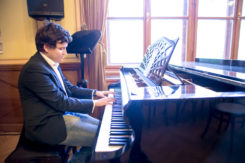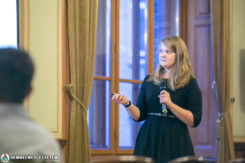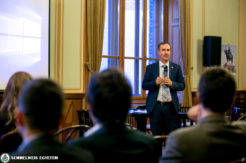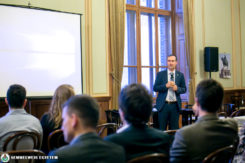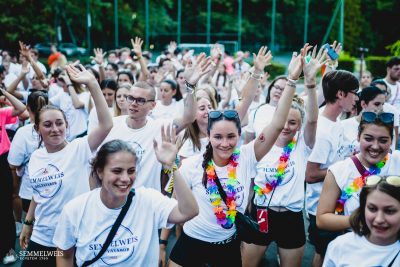Sixth year medical students, who received the Jellinek Harry scholarship, presented their scientific achievements of their ten-month stay at the Student Salon of the Kerpel-Fronius Talent Support Programme. At the event held at the Semmelweis Salon, Dr. Attila Szabó, secretary of the Kerpel-Fronius Talent Support Council, said in his welcome speech: it is a scholarship of high prestige, which has offered research opportunities for the best students for more than 25 years in Heidelberg and Freiburg.
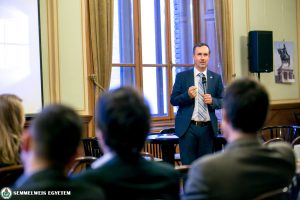 ‘Feedback from recent years also shows that excellent students from Semmelweis University go to both German universities,’ said Attila Szabó. He also mentioned that Semmelweis University has had an excellent relationship with Heidelberg University and the University of Freiburg for decades, so students receiving the scholarship can spend nearly one year conducting research in the best labs and clinics, which can be a positive defining experience in terms of their careers in the future,’ he added. The majority of the participants of the Jellinek Harry German-Hungarian scholarship programme later become PhD students who are likely to pursue an academic career, Dr. Attila Szabó pointed out. He mentioned that this year is the 200th birth anniversary of our university’s namesake, so those who were given the scholarship in this jubilee year will have a special place in the university yearbooks as well.
‘Feedback from recent years also shows that excellent students from Semmelweis University go to both German universities,’ said Attila Szabó. He also mentioned that Semmelweis University has had an excellent relationship with Heidelberg University and the University of Freiburg for decades, so students receiving the scholarship can spend nearly one year conducting research in the best labs and clinics, which can be a positive defining experience in terms of their careers in the future,’ he added. The majority of the participants of the Jellinek Harry German-Hungarian scholarship programme later become PhD students who are likely to pursue an academic career, Dr. Attila Szabó pointed out. He mentioned that this year is the 200th birth anniversary of our university’s namesake, so those who were given the scholarship in this jubilee year will have a special place in the university yearbooks as well.
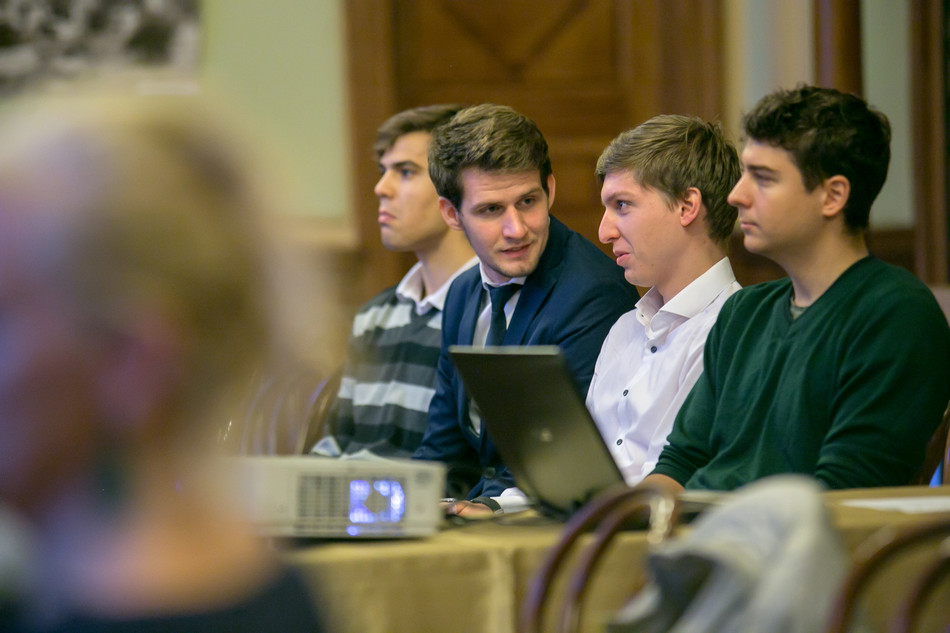 Following the opening speech, four previous Jellinek Harry scholarship students presented their academic achievements. First, Eszter Lévai, sixth-year medical student, presented her research work conducted at the Nephrology Laboratory of the Paediatric Clinic in Heidelberg, during which she studied the role of tight junction and proteins in peritoneal dialysis. She was followed by Máté Krausz, another sixth-year medical student, who was researching new aspects of the pathogenesis of ADA2 deficiency during the ten months spent at the of Centre for Chronic Immunodeficiency in Freiburg. Alex Ali Sayour, graduate medical student, examined a new cardioprotective drug family in myocardial infarction at the cardiosurgery research lab of Heidelberg University. Dr. Zoltán Erdélyi presented a project realized in the co-operation of Semmelweis University and the University of Freiburg, in which they researched the characterization of childhood blastoma. In the cultural programme of the students of the talent support programme, Dr. Gergely Tóth-Vajna and Dr. Zsombor Tóth-Vajna played a Händel piece on piano.
Following the opening speech, four previous Jellinek Harry scholarship students presented their academic achievements. First, Eszter Lévai, sixth-year medical student, presented her research work conducted at the Nephrology Laboratory of the Paediatric Clinic in Heidelberg, during which she studied the role of tight junction and proteins in peritoneal dialysis. She was followed by Máté Krausz, another sixth-year medical student, who was researching new aspects of the pathogenesis of ADA2 deficiency during the ten months spent at the of Centre for Chronic Immunodeficiency in Freiburg. Alex Ali Sayour, graduate medical student, examined a new cardioprotective drug family in myocardial infarction at the cardiosurgery research lab of Heidelberg University. Dr. Zoltán Erdélyi presented a project realized in the co-operation of Semmelweis University and the University of Freiburg, in which they researched the characterization of childhood blastoma. In the cultural programme of the students of the talent support programme, Dr. Gergely Tóth-Vajna and Dr. Zsombor Tóth-Vajna played a Händel piece on piano.
We have recently launched a series of interviews on the university website, in which we ask former scholarship students about their experiences and what they advise to future scholarship students. The articles of the continuously expanding series published so far can be read here and here.
Bernadett Bódi
Photo: Attila Kovács – Semmelweis University
Translation: Diána Módos

